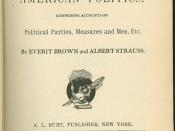Today in Britain, as in many Western countries, we have a representative democracy. This is generally viewed as opportunities for participation for the electorate in the form of general elections where they vote for a representative for their constituency. The winning party (the party with the most representatives in parliament) then forms a government that is accountable to the electorate for its actions; if the party makes unpopular moves then it will not be voted in at the next general election. In Britain today, people also expect openness and information from the government so that they know what is going on and how their country is being governed. Britain's government has evolved around a party system and most democratic countries have a party system too, but it is open to debate whether the party system enhances modern democracies or whether it does, in fact, make them less democratic.
Political Parties do perform many beneficial functions that help to enhance democracy.
They do their best to represent the majority wish of the country because if they don't then they will not be elected. For example, the current Labour government has enjoyed huge majorities in the previous two elections because they have tried to produce a manifesto of policies that appeal to everyone, there are some policies in there to please everyone. This means that almost every section of society gets represented in some way, a very positive advantage in favour of political parties.
Political parties are also very good at recruiting and training up political leaders, prospective leaders can join the political party of their choice and learn important skills that they will need to be a good leader such as the ability to communicate and a sense of what is politically acceptable. This political training means that better, more experienced...


